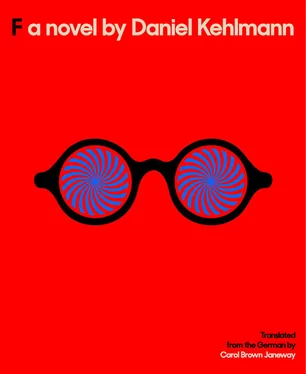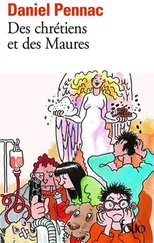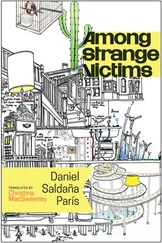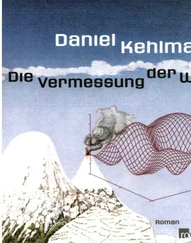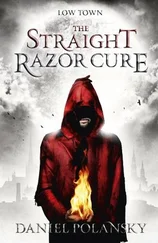Years later, long since fully grown and each of them enmeshed in his own particular form of unhappiness, none of Arthur Friedland’s sons could recall whose idea it had actually been to go to the hypnotist that afternoon.
It was 1984, and Arthur didn’t have a job. He wrote novels that no publisher wanted to print, and stories that appeared occasionally in magazines. It was all he did, but his wife was an eye doctor, and that paid the bills.
On the way there he talked to his thirteen-year-old sons about Nietzsche and different brands of chewing gum. They argued about an animated movie that had just opened starring a robot who was also the Redeemer, they traded theories about why Yoda talked so weirdly, and wondered whether Superman was stronger than Batman. Finally they pulled up in front of a line of row houses in a street in the outer boroughs. Arthur honked the horn twice, and within seconds a front door flew open.
His oldest son, Martin, had spent the last two hours sitting at the window waiting for them, dizzy with impatience and boredom. The panes had misted over with his breath, and he’d drawn faces with his finger, some solemn, some laughing, some with their mouths screaming wide. He had wiped the glass clean again and again, watching his breath spread a fine haze back over it. The clock had ticked and ticked — what was taking them so long? A car, then another car, then yet another car, and still it wasn’t them.
Then suddenly a car pulled up and honked twice.
Martin raced down the corridor, past the room into which his mother had retreated so as not to have to see Arthur. It was fourteen years since he had tiptoed swiftly out of her life, but it still tormented her that he could exist without needing her. Martin ran down the stairs and along the main hall, then straight across the street — so fast he didn’t even see the speeding car coming at him. Brakes squealed inches away from him, but he was already in the passenger seat, hands clasped above his head, and only now did his heart let up for a moment.
“My God,” Arthur murmured.
The car that had almost killed Martin was a red VW Golf. The driver kept up a pointless honking, perhaps out of a feeling that such an incident couldn’t go unremarked. Then he stepped on the gas and drove on.
“My God,” Arthur said again.
Martin rubbed his forehead.
“How can anyone be so dumb?” asked one of the twins from the backseat.
Martin felt as if his existence had split in two. He was sitting here, but he was also lying on the asphalt, crumpled and still. His fate seemed as yet undecided, both outcomes were still possible, and for a moment he too had a twin — one there outside, slowly fading away.
“He could be dead,” the other twin said matter-of-factly.
Arthur nodded.
“But is that really true? If God still has a purpose for him? Whatever. In that case nothing can happen to him.”
“But God doesn’t have to have a purpose for him. It’s enough if He knows. If God knows he’s going to be run over, he’ll be run over. If God knows nothing’s going to happen to him, nothing will happen to him.”
“But that can’t be right. That would mean it doesn’t matter what anyone does. Daddy, where’s the mistake?”
“There is no God,” said Arthur. “That’s the mistake.”
Everyone went quiet, then Arthur started the engine and drove off. Martin felt his heartbeat slow. Another couple of minutes and he’d be able to be certain that he was still alive.
“And school?” asked Arthur. “How’s it going?”
Martin looked sideways at his father. Arthur had put on a little weight and his shock of hair, which still had no gray in it, looked, as always, as if it had never been combed. “Math is hard, I’m not sure I’m going to pass. French is still a problem. But not English anymore, thank goodness.” He spoke fast, so as to get out as many words as he could before Arthur lost interest. “I’m good at German, we’ve got a new physics teacher, chemistry is the same as usual, but during experiments …”
“Ivan,” asked Arthur, “have we got the tickets?”
“In your pocket,” one of the twins answered, so now at least Martin knew which one of them was Ivan and which one was Eric.
He eyed them in the rearview mirror. As always, something in their absolute identicalness struck him as false, exaggerated, even unnatural. And this was some years before they started dressing identically too. This phase, in which they liked people to be unable to tell them apart, would only end when they turned eighteen, a short interval during which not even they themselves were entirely sure which of them was which. Thereafter they would repeatedly be overcome by a feeling that they’d each lost themselves at some point and were now leading the other’s life, just as Martin from now on would never be able to rid himself entirely of the suspicion that he had died that afternoon on the street.
“Stop staring like a moron,” said Eric.
Martin turned around and made a grab for Eric’s ear. He almost succeeded, but his brother ducked, seized his arm, and twisted it upward with a jerk. He screamed.
Eric let go and announced cheerfully, “Now he’s crying.”
“Pig,” said Martin shakily. “Stupid pig.”
“You’re right,” said Ivan. “Now he’s crying.”
“Pig.”
“Pig yourself.”
“You’re the pig.”
“No, you are.”
At that point they ran out of things to say. Martin stared out of the window until he was sure that his tears would stop. The shop windows that lined the street gave back the reflection of the car as it passed: first shrunken, then elongated, then bent into a half-moon.
“How’s your mother?” asked Arthur.
Martin hesitated. What was he supposed to say? Arthur had asked this same question right at the beginning, seven years ago, the first time they met. His father had seemed enormously tall, but also weary and somewhat absent, as if enveloped in a fine mist. He had felt shy in front of this man, but also, in some way that he didn’t quite understand, a kind of pity.
“How’s your mother?” the stranger had asked, and Martin had wondered if this really was the man he had encountered so often in his dreams, always in the same black raincoat, always faceless. But it was only that day in the ice cream parlor, as he dug around in his fruit sundae with chocolate sauce, that Martin had realized just how much he enjoyed not having a father. No shining example, no predecessor, and no burden, just a vague image of someone who might show up one day. And now this was him? His teeth weren’t exactly straight, his hair was all over the place, there was a stain on his collar, and his hands looked weathered. He was a man who could have been any other man, a man who looked just like any other man on the street, on the train, anywhere.
“Just how old are you now?”
Martin had swallowed and then said, “Seven.”
“And this is your doll?”
It took Martin a moment to realize that his father was asking about Miss Miller. He had brought her with him, as he always did; he was holding her under his arm without even thinking about it.
“So what’s she called?”
Martin told him.
“Funny name.”
Martin didn’t know how to reply. Miss Miller had always been Miss Miller, that was simply her name. He realized his nose was running. He looked around, but Mama was nowhere to be seen. She had left the ice cream parlor silently as soon as Arthur came in.
No matter how often Martin thought back to that day, and no matter how much he tried to summon up that conversation from the shadows of his memory, he always failed. The reason was that he had imagined it too often before it took place, and the things they actually said to each other soon merged into the things he’d imagined so often over the years. Had Arthur really said that he didn’t have a job and was dedicating himself to thinking about life, or was it just that later, when Martin knew more about his father, he simply attributed this answer to him as the only one that seemed to fit? And could it be that Arthur’s answer to the question of why he had walked out on him and his mother, was that anyone who gave himself over to captivity and the restricted life, to mediocrity and despair, would be incapable of helping any other human being because he would be beyond help himself, succumbing to cancer, heart disease, his life cut short, rot invading his still-breathing body? It was totally plausible that Arthur would give such an answer to a seven-year-old, but Martin didn’t really think it likely that he would have felt confident enough to ask the question in the first place.
Читать дальше
